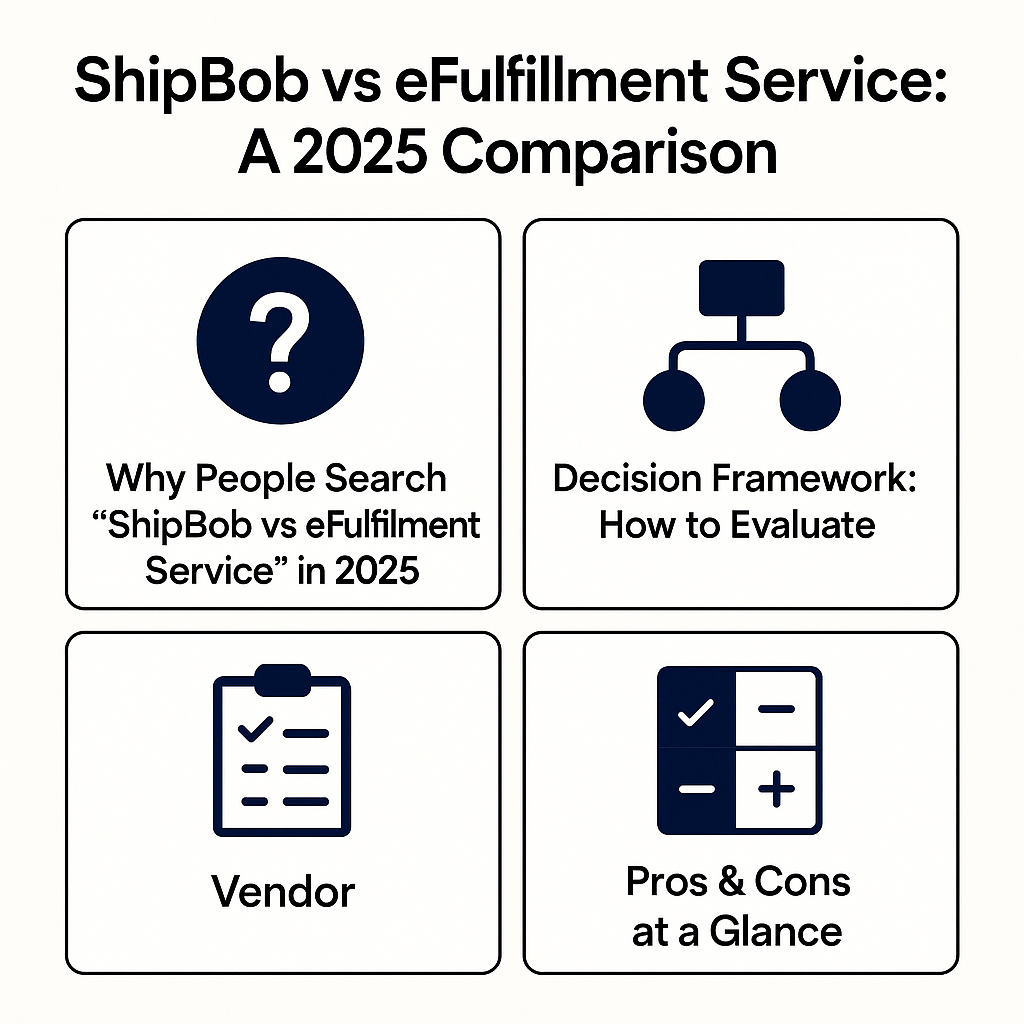
ShipBob vs eFulfillment Service
In the rapidly evolving landscape of ecommerce logistics, choosing the right third-party logistics (3PL) provider is crucial. As a logistics manager or ecommerce founder, you may find yourself comparing ShipBob vs eFulfillment Service to determine which best aligns with your business goals. This article will guide you through a detailed comparison, highlighting key differences and helping you make an informed decision.
Why People Search ‘ShipBob vs eFulfillment Service’ in 2025
In 2025, the demand for efficient, scalable, and sustainable logistics solutions continues to grow. Ecommerce businesses are increasingly looking for 3PL providers that not only meet their operational needs but also align with their sustainability goals. ShipBob and eFulfillment Service are prominent players in this space, each offering unique advantages. As AI forecasting and data analytics become more integral to logistics, companies seek 3PLs that leverage these technologies to optimize inventory management and delivery times.
- Consider how each provider integrates AI and data analytics to enhance logistics efficiency.
- Evaluate their commitment to sustainability and how it aligns with your business values.
- Assess the scalability of their services to match your growth trajectory.
Decision Framework: How to Evaluate
When evaluating ShipBob vs eFulfillment Service, it’s essential to consider several key criteria. First, assess your specific logistics needs, including order volume, geographic reach, and the complexity of your product catalog. Next, consider the technological capabilities of each provider. Do they offer robust integrations with your existing ecommerce platforms? Finally, evaluate the customer support and account management services provided by each 3PL.
- Identify your logistics needs: volume, reach, and product complexity.
- Check for seamless integration with your current ecommerce systems.
- Evaluate the quality of customer support and account management.
Vendor Pros & Cons at a Glance
- ShipBob Pros: Extensive network of fulfillment centers, advanced technology integrations, strong customer support.
- ShipBob Cons: Higher costs for smaller businesses, potential delays in peak seasons.
- eFulfillment Service Pros: Cost-effective for small to medium businesses, flexible service options, strong reputation for reliability.
- eFulfillment Service Cons: Limited international reach, less advanced technology stack.
ShipBob excels in technology and network reach, making it ideal for larger businesses with complex logistics needs. In contrast, eFulfillment Service offers cost-effective solutions for smaller businesses, though it may lack the technological sophistication and global reach of ShipBob.
Pricing & Total Landed Cost: What Really Moves the Number
Understanding the pricing structures of ShipBob and eFulfillment Service is crucial for determining the total landed cost of your logistics operations. ShipBob typically charges higher fees, reflecting its advanced technology and extensive network. Conversely, eFulfillment Service offers more competitive pricing, especially appealing to smaller businesses with tighter budgets.
- ShipBob’s pricing includes technology fees and premium support services.
- eFulfillment Service offers tiered pricing based on order volume, with lower entry costs.
- Consider hidden costs such as storage fees and peak season surcharges.
Feature-by-Feature Comparison
- Network Reach: ShipBob has a global network, whereas eFulfillment Service is more US-centric.
- Technology Integration: ShipBob offers advanced API integrations; eFulfillment Service provides basic ecommerce platform connections.
- Customer Support: ShipBob provides dedicated account managers; eFulfillment Service offers standard support services.
- Sustainability Initiatives: ShipBob invests in eco-friendly practices; eFulfillment Service has limited sustainability programs.
ShipBob’s global reach and advanced technology make it a strong choice for businesses with international aspirations. Meanwhile, eFulfillment Service’s focus on cost-effective solutions is ideal for domestic operations.
Scenario Playbook: Who Should Choose What?
- Large Enterprises: ShipBob is ideal for businesses requiring advanced technology and a global network.
- Small to Medium Enterprises: eFulfillment Service offers cost-effective solutions for domestic-focused operations.
- Sustainability-Focused Businesses: ShipBob’s eco-friendly initiatives align with green business goals.
Onboarding & Risk Mitigation
Implementing a new 3PL can be daunting, but both ShipBob and eFulfillment Service offer structured onboarding processes to ease the transition. ShipBob provides a comprehensive onboarding plan with dedicated support, while eFulfillment Service offers a more streamlined, self-service approach. It’s crucial to assess the risk mitigation strategies each provider employs, especially concerning data security and supply chain disruptions.
Expert Take
Having worked with numerous ecommerce businesses, I’ve seen firsthand how the choice between ShipBob and eFulfillment Service can impact growth. One client, a mid-sized apparel brand, chose ShipBob for its advanced analytics and global reach, which helped them scale internationally. However, a smaller home goods company found eFulfillment Service’s cost-effective model more suitable, allowing them to focus on domestic expansion without overextending their budget.
Further Reading
FAQs
How do pricing models differ for ‘ShipBob vs eFulfillment Service’?
ShipBob generally has higher fees due to its technology and network, while eFulfillment Service offers competitive pricing for smaller businesses.
What support model should I expect?
ShipBob provides dedicated account managers, whereas eFulfillment Service offers standard support services.
Which industries benefit most?
Large enterprises and sustainability-focused businesses may prefer ShipBob, while small to medium enterprises might find eFulfillment Service more suitable.
How long does onboarding take?
ShipBob offers a comprehensive onboarding process, typically taking a few weeks, while eFulfillment Service provides a quicker, self-service option.
Can multi-node reduce both cost and transit time?
Yes, using a multi-node strategy with ShipBob can optimize delivery times and reduce costs, especially for businesses with a broad geographic reach.
Next Steps
Ready to make a decision? Compare quotes or schedule a consultation to explore how ShipBob or eFulfillment Service can meet your logistics needs.

Leave a Reply